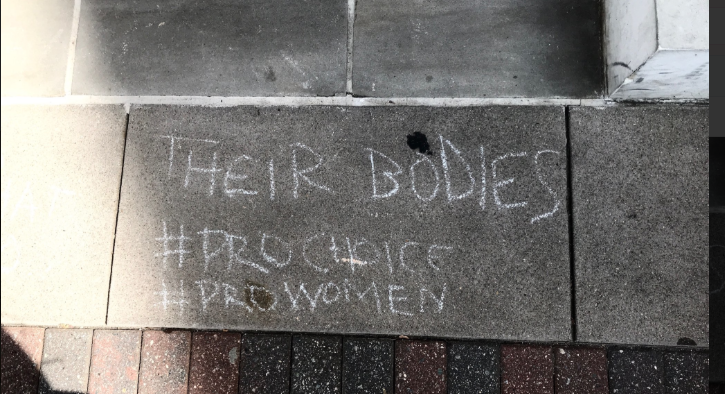Democracy is lost within political polarization
4 min read
Grace Winfield | Blue and Gray Press
By ABIGAIL BUCHHOLZ
Staff Writer
Political polarization is destroying American democracy by creating a culture where single issue voting is the norm and well informed citizens are a rarity.
Reflections of this polarization can be found on our very own University campus regarding the debate on abortion legislation.
Just last semester the UMW campus got a taste of the type of tension that this divisiveness creates. A chalking campaign sponsored by a pro-life group took the campus by storm as their messages appeared on several major walkways. The response to these political messages was abrupt and harsh with many being washed away and others being crossed out and rewritten to favor a more pro-choice perspective.
The issue of abortion is notorious for dividing individuals along party lines. In a recent survey of UMW students, it was found that only 6 percent of respondents deviated from their party’s stance on abortion.
The interpersonal divide that issues like this create needs to be reevaluated.
For a campus that advertises inclusivity, these acts of stout aggression and willful ignorance don’t make UMW took good. The fact of the matter is, vandalism was not the proper response, regardless of your political beliefs, because it solved nothing, and no one’s opinions were changed. This vandalism spoke to how stuck in their ways each side was, and how sure they were that no middle ground or discussion was possible.
The issue of abortion is important but so is productive communication and acceptance of differences along both sides. Nothing is achieved by erasing each others message and refusing to listen, we might as well be shoving cotton in our ears for all the good it does us.
Campaigning candidates are well aware of these divides, and capitalize on them to manipulate voters. This capitalization is easily mistaken for candor. Statistically, the percentage of legislation passed by legislators rarely involves the hot topic issues that helped them gather large crowds during elections. For example, has anyone seen Mexico start work on that border wall yet? Has Obama Care been fully repealed?
The media doesn’t help this situation of political polarization and single issue voting either, because politics is all about publicity. No one is going to tune into a news station that only ever talks about bills being passed regarding taxes, new parking regulations, and changes in the nation’s energy use. These issues are impacting our everyday lives and we should be paying more attention, but society likes drama–and there is drama in divisive issues like abortion. There exists a problem were citizens focus in on candidates stances on the issues that get a lot of publicity, and then miss out on the opinions that might actually impact their everyday lives.
In a poll of UMW students it was found that the issue of abortion is seen by 68.75 percent as being strongly or very strongly impacting their choice of candidate. Abortion legislation is a topic heavily tackled by candidates because they know that hot issues attract media coverage. And so, catchy phrases like, “Defund Planned Parenthood!” are created to pander to their audiences need for clear and concise controversy.
A lot of these promises that politicians make are misleading, and this is further dangerous to democracy because it perpetuates the uniformed nature of the public. Many pro-choice voters support the defunding of Planned Parenthood because that’s the rhetoric they are fed by their candidates of choice, but do they really understand what that means?
Often times politicians call to defund Planned Parenthood because they don’t approve of the safe, legal abortions that are taking place there. Their rhetoric is used to shock voters and make it appears as if the federal government is funneling money into the Planned Parenthood at alarming rates–yet the Hyde Amendment Codification Act of 1976 exists.
The act dictated that no funds from the federal government could go to abortion procedures unless the pregnancy was the result of rape or incenst, or the mother’s life was at risk. These candidates centering their message around defund Planned Parenthood are simply using aggressive rhetoric to fight for a non starter issue. The occurring abortions are not being funded by the federal government through medicaid, instead they are being covered by the individuals’ insurance.
It’s clear that politicians are taking advantage of the modern divisiveness of politics in order to further their pursuit of power–and citizens are too eager to believe whatever platform or slogan their candidate throws at them.
In the times like these UMW students need to focus less on the polarizing issues that divide us, and more on the issues that benefit everyone. We need to understand that the goal of politicians is to win elections, and they will stop at nothing to sway a few votes. We need to concentrate on studying the polarizing issues ourselves, so that the misleading rhetoric of the divided doesn’t get in the way of us making our own competent decisions.


